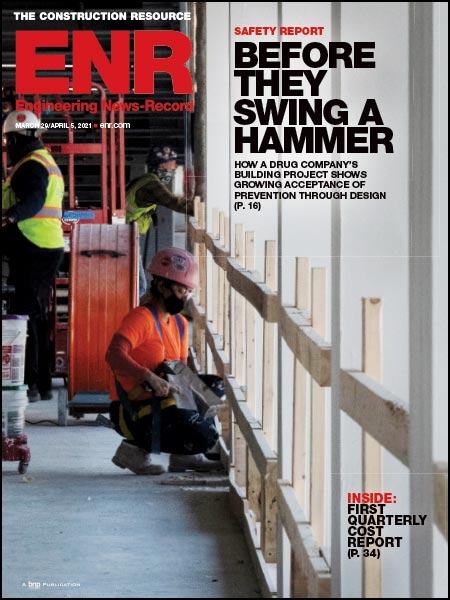The National Railroad Construction & Maintenance Association also reports defeat for a transportation-related sales-tax increase in Alameda County, Calif. that proponents hoped would generate $7.8 billion over 30 years. Similar tax-hike initiatives lost in Clark County, Wash.; Harris County, Texas; and Memphis, Tenn. Voters in Tigard, Ore. passed a measure now requiring a public vote before local taxes and fees are hiked to fund light rail expansion.
Higher Education Measure Makes the Grade in N.J.
Higher education in New Jersey is set for a big boost with voter approval of a measure to borrow $750 million for college and university construction projects. It is the first for higher-ed upgrades since 1988.
"At [New Jersey Institute of Technology] and at colleges and universities throughout the state, bond funding will mean new science labs, studios, and research facilities, making a major investment in New Jersey's educational and economic competitiveness," says NJIT President Joel Bloom. The measure, which would still require matching funds from schools for projects, would create "nearly 10,000 jobs," he says.
Paul Shelly, a spokesman for the New Jersey Association of State Colleges and Universities, says "still to be determined" is how funds will be distributed among public and private schools. "Once institutions know their allocation, they can make a decision about which priority projects they want to fund with the proceeds and required match," he says. "Most of these projects relate to competitiveness in the S.T.E.M. fields and health science professions."
Shelly adds that that campus sports facilities and other revenue-producing projects may gain from a state law enacted in August that will allow public-private finance ventures for the first time.
Maine voters also approved $11.3 million for higher education projects, but in a narrow 51% to 49% vote.
Voters were more supportive of casino expansion to generate revenue, passing measures in Maryland and Rhode Island that are expected to generate new construction.
Local Construction Investments Pass with Ease
Voters seemed more bullish on school construction measures in local elections. As predicted, Houston voters approved nearly $2 billion for projects, with El Paso, Austin and other cities also passing their proposed measures.
According to a Reuters report, voters approved $5.4 billion of $6 bllion in total bond measures on muncipal ballots across the state, despite warnings from the state's top finance official that proliferating measures could overload taxpayers with debt.
Californians also voiced support for capital investment, approving $12.8 billion of the $14.8 billion proposed on local ballots in the state. San Diegans approved a $2.8-billion school construction finance measure.
Voters in eight municipalities in Connecticut passed "by wide margins" a measure to allow the Hartford-based Metropolitan District Commission to borrow $800 million to fund the second phase of a mandated 15-year, $2.1-billion sewerage improvement project, says the Hartford Courant.
Voters in Arizona were not so enthusiastic, rejecting an extension of a temporary sales tax increase that would have raised $900 million in revenue for education and $100 million for the state infrastructure fund, says ARTBA's Black.
The rejection came despite a $350,000 cash infusion from supporters, including construction industry interests. Gov. Jan Brewer (R), opposed the measure, claiming it would limit the Legislature's ability to balance the state budget.
"While this is an unfortunate outcome, it does not mean the issues of a floundering education system in our state or the continued raids on the highway fund go away, says a website message from Gary Haydon, outgoing chairman of the Arizona chapter of the Associated General Contractors. "We cannot forget that $1.7 billion has been taken from highway funding coffers over the last 13 years. Political leaders tell us that the fund sweeps are necessary during the difficult times, however, these sweeps continue even when times are good."
Haydon, who is president of Phoenix-based Haydon Building Corp. adds that "while those legislative decisions, at first, seem to be sound fiscal policy, they are being made at the expense of the taxpayers who intended their fees go to road construction and maintenance." He says Arizona’s rural highways are the eighth deadliest in the nation, according to data from The Road Information Program (TRIP).
Haydon says supporters may push to include the proposal on state ballots in 2014.
Mixed Results for Broader Industry-Focused Initiatives
According to the Initiative & Referendum Institute at the University of Southern California, "results were mixed" for measures affecting union activities.
Unions received good news in California where voters rejected Proposition 32 by a 44-56 margin that would have prohibited union dues from being used for political purposes without explicit authorization of members, prohibited union and corporate contributions to campaigns, and prohibited government contractors from contributing to campaigns. Voters rejected similar measures in 1998 and 2005 by small margins.
The news was less positive for unions in Michigan, where voters rejected a measure to include the right to collective bargaining in the state constitution.






Post a comment to this article
Report Abusive Comment